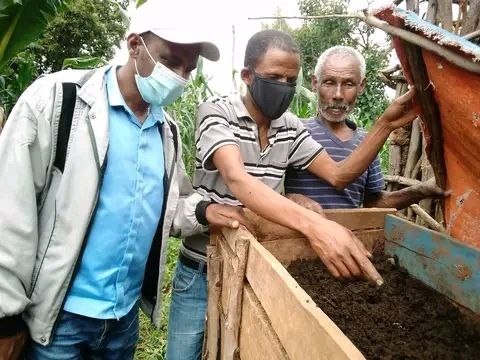Vermicompost can be utilized in various ways within the circular economy, encompassing agricultural sustainability, waste management and pollutant remediation. The recycling of organic wastes to produce vermicompost has numerous advantages for both consumers and the environment, leading to a more sustainable future in agriculture. Vermicompost is an effective method in the circular economy that plays a crucial role in promoting food security. It greatly enhances agricultural yield and quality, while also improving the nutritional value of crops.
Vermicompost preparation

Agricultural land degradation is a significant issue in Ethiopia, resulting from factors such as rapid population growth, deforestation, insufficient vegetative cover, imbalanced crop and livestock production, and challenging topography. Specifically, crop fields exhibit soils that have undergone extensive weathering and are lacking in fertility, with lower levels of organic matter. These fields also have open nutrient cycling systems due to continuous farming practices. These factors lead to a decline in soil fertility and crop productivity, ultimately resulting in reduced income for farmers and increased food insecurity.
Both organic and chemical fertilizers are important for improving crop productivity and preserving soil health. Nevertheless, the high prices of chemical fertilizers have resulted in a decrease in their usage, leading to a decline in crop productivity in the country. Thus, in order to maintain the efficiency of lands and crops, it is crucial to encourage the adoption of organic fertilizers. Vermicomposting is a highly effective technique for creating nutrient-rich compost by harnessing the power of earthworms.
Vermicomposting is typically described as the aerobic decomposition of organic residues by utilizing the optimal biological activity of earthworms and micro-organisms. The process relies on the earthworms to break down, blend, and enhance microbial activity in the organic waste material. Earthworms consume organic solids and transform them into earthworm biomass and respiration byproducts. They also produce a peat-like substance called vermicompost. Compared to thermal composting, vermicomposting produces a product that has a lower mass, higher humus content, shorter processing time, lower likelihood of phytotoxicity, and usually greater fertilizer value. Additionally, vermicomposting also yields earthworms that can be used for other purposes.
Farmers who have participated in the project implemented by Hawassa Agricultural research center in Wondo Genet district explained that they benefited a lot from vermicomposting to enhance their agricultural production such as vegetables by improving the fertility of their farmland. Furthermore, they stated that their need for chemical fertilizers, which is very expensive has significantly reduced and their income and livelihood have been improved because of using vermicompost.
Before this technology was introduced in the area, all cultivated land was rehabilitated by using chemical fertilizer for boosting crop yields in Wondo Genet district. But now many farmers have adopted the production and utilization of vermicompost. Particularly, many women farmers reported to use vermicompost and they appreciated the opportunity to participate in the project.
Earthworms efficiently transform organic matter into worm biomass and respiration products, while also producing distinct castings as a byproduct. During this process, earthworms and microorganisms work together to enhance the breakdown of organic matter. Earthworms are essential for soil biology, as they act as natural bioreactors that efficiently break down organic waste and eliminate harmful soil pathogens through their voracious feeding habits. They play a crucial role in the natural cycle of transferring nutrients from deceased organisms to the living ones.
Overall, production and utilization of vermicompost is feasible by smallholder farmers. the farmers can produce good quality vermicompost just by using locally available materials and with minimum technical support or practical training.
The main benefits of vermicompost include the following:
- Improving soil fertility and reducing soil erosion
- Controlling pests and diseases that are borne by soil
- Increasing crop yields
- Reducing greenhouse gas emissions
- Building climate resilience
- Improving soil health and water drainage
Vermicompost, according to key informants, would not only improve the organic carbon status of the soils, but it would also improve the soil's capacity to store water, the flocculation of the soil, and the availability of nutrients, so improving the soil and crop production in a sustainable manner.
Introducing earthworms into soil or to from vermicompost is among the best among all sustainable agriculture practice that has enhanced soil productivity, reduced cost for chemical fertilizer purchase and motivated smallholder farmers to widely adopt vermicompost production and utilization, as stated by farmers during focus group discussions.
According to farmers, vermicompost offers numerous benefits in comparison to chemical fertilizer. It shortens the time it takes for crops to mature. The challenges faced during production include nocturnal ant invasions, limited market access, and a shortage of materials for feed preparation.
Vermicompost has high potential for scaling up since it can be utilized in various ways within the circular economy, encompassing agricultural sustainability, waste management and pollutant remediation. The recycling of organic wastes to produce vermicompost has numerous advantages for both consumers and the environment, leading to a more sustainable future in agriculture.
There are several opportunities to widely promote and foster the adoption of vermicompost among smallholder farmers, including women and youths, to tackle the problem of soil fertility depletion, agricultural land degradation and food and nutrition insecurity, including strong government focus to agricultural development, presence of non-governmental organizations that promote the vermicompost technology.

